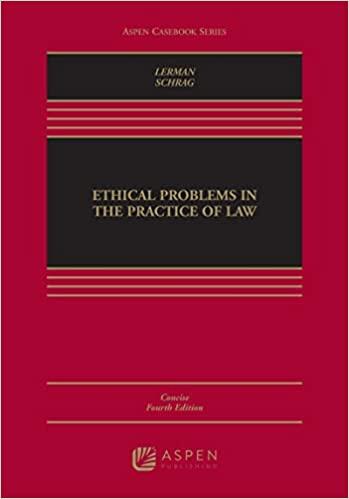Question
FACTS (Part A Questions are below)Maria and Alfonzo run a business called 'Biosafety First Transport'. For almost all of their lives they have transported dangerous
FACTS (Part A Questions are below)Maria and Alfonzo run a business called 'Biosafety First Transport'. For almost all of their lives they have transported dangerous goods to and from prescribed Commonwealth authorities, for which they held a valid licence (now expired) under the Dangerous Goods (Possession and Transport) Act2001 (Cth) (the Act). To date, they have transported radioactive materials, which are defined as dangerous goods in Schedule 1 of the Act, for the purposes of nuclear science and research. However, as the Federal Government has started outsourcing its research to private bodies, the amount of work available to Maria and Alfonzo has started to decrease. They want to start transporting white phosphorous, also defined as a dangerous good in Schedule 1 of the Act, for which there is a growing demand. White phosphorous is used in the production of flares and fireworks. Knowing how tightly regulated this area is, Maria and Alfonzo complete a Government certified 'refresher course' to update their skills before they apply to the Minister for a licence under the Act. They also upgrade all of their transport equipment to ensure that they comply with Government regulations. Maria and Alfonzo submit an application to the Minister for a new licence to transport white phosphorous to a factory which manufactures emergency flares for distribution to marine and shipping safety stores in Australia. The flares, which are mandatory components of onboard first aid kits, are sold to private individuals, national marine research and private shipping companies. The factory also uses the white phosphorous for an additional purposeto produce fireworks for the world-renowned fireworks display on the Sydney Harbour Bridge on New Year's Eve.Upon receipt of their application, the Minster, in accordance with powers given under the Act, seeks information about whether or not Maria and Alfonzo are fit and proper persons to be licensed. The Minister's delegate produces a report, presented to the Minister, which outlines that Maria and Alfonzo have no criminal record. Subsequently, the Minster learns that Maria's elderly mother was recently found to have overstayed her short term visitor's visa and that Maria was likely to have known about this as her mother, on holiday from Hungary, was staying with them at Maria and Alfonzo's house. The Minster is concerned that there is insufficient regulation of migration and of visa violations in Australia, and believes Maria's mother's visa violation is a reason to deny Maria and Alfonzo's application. Additionally, the Minister is of the view that granting Maria and Alfonzo's licence is not in the public interest as the white phosphorous will not always be used by a prescribed Commonwealth authority. The Minister also believes that the New Year's Eve fireworks display, even though run by a prescribed authority, is a waste of time and that no more Government money should be spent on the 'silly spectacle'. Maria and Alfonzo receive a letter from the Minister which states that:The Minister for National Security has decided to refuse the licence application made under section 10 of the Act. The Minister's reasons are that Maria and Alfonzo are not fit or proper persons under the Act due to their connection to persons in breach of the Australian Migration Act. Maria and Alfonzo are very disappointed. Maria is outraged that her mother has been brought into this and no one mentioned it to her! They were keen to start transporting white phosphorous as soon as possible. They wish to challenge this decision.
Meanwhile, in line with the relevant registration and tabling requirements, the Minister passes the following regulation: Regulation 1: Under section 15(1), science and education may be interpreted to include a broad range of activities. However, where dangerous goods are used for science and education activities relating to the research of climate change, licences to possess or transport such goods shall not be granted under the Act. QUESTIONS FOR PART A .Answer all of the following questions: 1) Examine the regulation passed by the Minister. Determine whether the regulation is valid and how it may be challenged. (5 marks) 2) Maria and Alfonzo wish to challenge the Minister's decision rejecting their licence application. Is there jurisdiction to challenge this decision and if so, what is the basis for jurisdiction? (8 marks) 3) Assuming there is jurisdiction, what grounds of review are available to Maria and Alfonzo and what are their chances of success? (15 marks) 4) Outline the most appropriate remedies for Maria and Alfonzo and their availability. (2 marks)
1. "The grounds of judicial review provide the courts with too much power. Many grounds invite the courts to engage in review of the merits of decisions in breach of the legality-merits distinction."Do you agree or disagree? Critically analyse this statement with reference to relevant case law and principles. OR 2. "Existing standing requirements should be reformed, as they limit the ability for decisions to be challenged in the public interest. In the interests of justice, we need less restrictive standing tests. We should allow concerned citizens to seek judicial review of bad decisions."Critically analyse this statement with reference to existing tests for standing for judicial review in administrative law.
Step by Step Solution
There are 3 Steps involved in it
Step: 1

Get Instant Access to Expert-Tailored Solutions
See step-by-step solutions with expert insights and AI powered tools for academic success
Step: 2

Step: 3

Ace Your Homework with AI
Get the answers you need in no time with our AI-driven, step-by-step assistance
Get Started


